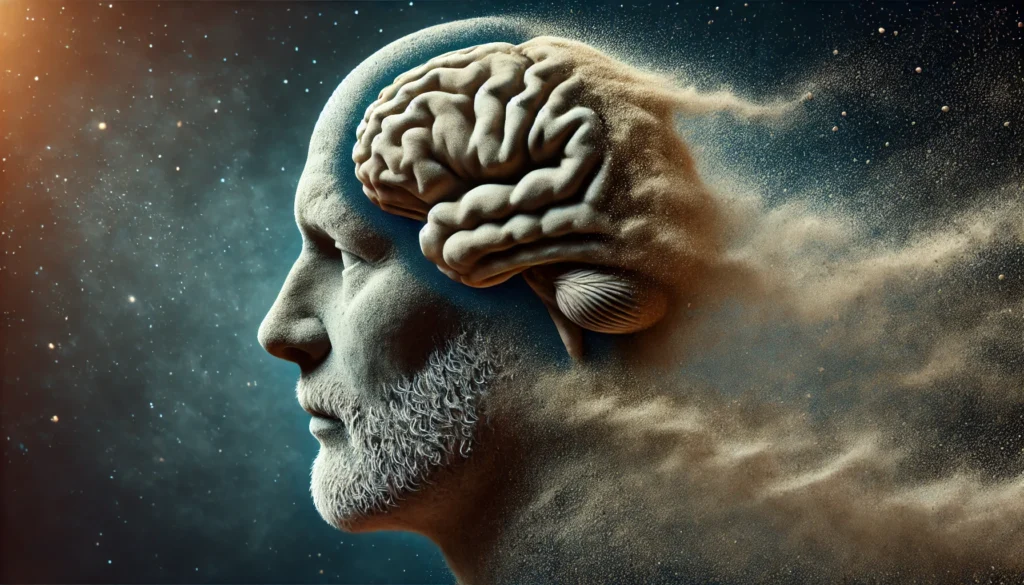Aging is an inevitable biological process, yet its effects on cognitive function are often misunderstood. The phrase “is aging in your mind” suggests that mental outlook and attitude play a pivotal role in how we experience aging. The concept of “age mentality” refers to the psychological and emotional factors that shape how individuals perceive and respond to the process of growing older. While biological aging affects the body and brain, emerging research indicates that one’s beliefs, attitudes, and behaviors can significantly impact cognitive health and longevity. This article delves into the science of cognitive aging, exploring how psychological perspectives on aging influence brain function, memory retention, and overall well-being. By understanding the relationship between age mentality and cognitive health, we can adopt strategies to maintain mental acuity and enhance quality of life well into later years.
You may also like: How Does Memory Change with Age? Understanding Neural Pathway Strengthening in Seniors

The Science of Cognitive Aging
Cognitive aging is a complex interplay of genetic, environmental, and lifestyle factors. Neuroscientific research demonstrates that brain plasticity persists throughout life, meaning that cognitive abilities can be preserved and even improved with proper mental engagement. While some decline in memory and processing speed is common with age, studies show that individuals who maintain a positive age mentality experience less cognitive decline compared to those who perceive aging negatively. Understanding how the brain ages and what influences its trajectory can empower individuals to take proactive measures in preserving cognitive function.
The brain undergoes various structural and functional changes over time. Gray matter volume tends to decrease, particularly in regions associated with memory and executive function, such as the hippocampus and prefrontal cortex. However, neuroplasticity—the brain’s ability to reorganize itself by forming new neural connections—remains active throughout life. Engaging in mentally stimulating activities, fostering social connections, and maintaining a growth-oriented mindset contribute to cognitive resilience, counteracting age-related decline.

Psychological Aspects of Aging
The concept of “age mentality” is rooted in psychological theories of aging, including the self-fulfilling prophecy and stereotype embodiment theory. These frameworks suggest that individuals internalize societal beliefs about aging, which in turn shape their cognitive and physical outcomes. Studies have found that individuals who associate aging with decline and frailty tend to exhibit poorer memory performance and increased susceptibility to neurodegenerative diseases. Conversely, those who view aging as a phase of growth and wisdom maintain better mental health and cognitive function.
A positive age mentality is linked to lower stress levels, reduced inflammation, and a greater likelihood of engaging in health-promoting behaviors. For example, older adults who embrace lifelong learning and adaptability demonstrate greater problem-solving skills and emotional resilience. By challenging negative stereotypes and adopting an optimistic perspective on aging, individuals can reshape their cognitive trajectory and enhance mental well-being.

Memory Retention and Age Mentality
Memory performance is a key indicator of cognitive health, and research suggests that belief systems regarding aging can directly impact memory retention. A study conducted at Yale University found that older adults who held positive beliefs about aging performed better on memory tests compared to those with negative perceptions. The mechanism behind this phenomenon involves stress reduction and increased motivation to engage in cognitive exercises.
Stress hormones, such as cortisol, have been shown to impair memory and cognitive function over time. Individuals who perceive aging as a time of decline often experience chronic stress, which accelerates neuronal damage in the hippocampus. On the other hand, those who maintain a proactive approach to cognitive health engage in memory-enhancing activities, such as reading, puzzles, and social interaction, leading to improved memory retention and recall abilities.
Lifestyle Factors That Influence Cognitive Aging
While psychological factors play a crucial role in cognitive aging, lifestyle choices also significantly impact brain health. Nutrition, physical activity, sleep, and social engagement contribute to the preservation of cognitive function. A well-balanced diet rich in antioxidants, omega-3 fatty acids, and essential vitamins supports brain health by reducing oxidative stress and inflammation.
Regular physical activity promotes neurogenesis, the growth of new neurons, and enhances blood flow to the brain. Studies indicate that individuals who engage in consistent exercise routines exhibit better executive function and memory performance. Furthermore, social interaction provides cognitive stimulation and emotional support, reinforcing neural pathways and preventing feelings of isolation, which have been linked to cognitive decline.
Sleep quality is another critical factor in maintaining cognitive health. The brain consolidates memories and clears metabolic waste during sleep, making it essential for long-term brain function. Poor sleep patterns have been associated with increased risk of Alzheimer’s disease and other forms of dementia. By prioritizing healthy sleep habits, individuals can optimize cognitive function and sustain mental clarity.
Strategies for Cultivating a Positive Age Mentality
Adopting a positive age mentality requires intentional effort and a commitment to mental and physical well-being. Practicing mindfulness and gratitude can help shift perceptions of aging from a perspective of loss to one of appreciation and growth. Engaging in lifelong learning through reading, creative endeavors, and acquiring new skills fosters cognitive stimulation and adaptability.
Social connections play a crucial role in shaping one’s age mentality. Surrounding oneself with supportive and like-minded individuals who value intellectual curiosity and active living reinforces positive beliefs about aging. Additionally, reframing negative self-talk and challenging societal stereotypes about aging can lead to increased confidence and resilience.
The Role of Mindset in Preventing Cognitive Decline
Neuroscientific studies highlight the connection between mindset and cognitive resilience. The placebo effect, commonly associated with medical treatments, also applies to cognitive health. Individuals who believe they have control over their mental capabilities are more likely to take proactive steps in maintaining brain function. This belief fosters engagement in brain-boosting activities, leading to tangible improvements in cognitive performance.
Cognitive training programs, such as memory exercises, problem-solving tasks, and meditation, have been shown to enhance neural connectivity and delay the onset of cognitive decline. By adopting a growth mindset and embracing challenges, individuals can build cognitive reserves that act as a buffer against age-related changes in the brain.
Frequently Asked Questions (FAQ)
Is aging in your mind, or is it purely biological?
Aging is influenced by both biological processes and psychological factors. While genetics and cellular aging play a significant role, research suggests that the way we perceive aging—our “age mentality”—can impact cognitive and physical health. Individuals who maintain a youthful mindset tend to experience better mobility, cognitive function, and even a longer lifespan. Studies have shown that those who believe aging leads to decline often exhibit faster physical deterioration compared to those who see it as a period of growth and opportunity. The mind-body connection in aging demonstrates that while aging is inevitable, how one experiences it can be shaped by mental resilience and a positive outlook.
How does age mentality influence overall health?
Age mentality plays a crucial role in shaping health outcomes, affecting everything from immune function to cognitive performance. People with a positive perception of aging are more likely to engage in healthy behaviors such as regular exercise, social engagement, and a balanced diet. Conversely, those who believe they are “too old” to change often succumb to a sedentary lifestyle and mental decline. Psychological stress related to aging can accelerate inflammation and cellular damage, making a negative age mentality a risk factor for chronic diseases. Understanding that is aging in your mind to some extent can empower individuals to adopt habits that promote longevity and vitality.
Can changing your perception of aging reverse certain effects of growing older?
While aging cannot be reversed entirely, shifting one’s age mentality can mitigate some of its negative effects. Research on neuroplasticity shows that the brain can form new neural connections at any age, enabling cognitive flexibility and resilience. Individuals who remain curious, challenge themselves intellectually, and maintain a sense of purpose often show fewer signs of mental decline. Furthermore, psychological interventions, such as mindfulness and cognitive-behavioral therapy, have been shown to help older adults improve their outlook on aging, leading to better mental and physical health. This reinforces the idea that is aging in your mind as much as in your body, offering hope for maintaining a high quality of life.
Why is memory decline associated with aging, and can it be prevented?
Memory decline is commonly associated with aging due to changes in brain function, including reductions in neurotransmitter levels and hippocampal shrinkage. However, age mentality also plays a role, as individuals who expect memory loss to occur may inadvertently reinforce forgetfulness. Engaging in mental exercises, learning new skills, and maintaining social interactions can help sustain cognitive function. Recent research highlights the benefits of a “growth mindset” toward aging, showing that those who actively work to keep their minds sharp can delay or even prevent memory loss. This further supports the notion that is aging in your mind, and maintaining an engaged and optimistic perspective can promote brain health.
What research can we use on memory and aging to enhance cognitive function?
Various studies explore the intersection of memory and brain function, providing valuable insights into cognitive aging. Neuroscientists have identified lifestyle factors such as diet, physical activity, and mental engagement as key contributors to cognitive longevity. Research on the gut-brain axis, for instance, suggests that a healthy diet rich in antioxidants and omega-3 fatty acids can protect against neurodegenerative diseases. Cognitive training programs, including those that challenge problem-solving and memory recall, have been found to improve neural plasticity. By leveraging this research, individuals can integrate habits that support memory retention and reduce the risk of cognitive decline.
How does social interaction impact age mentality and cognitive health?
Social connections play a crucial role in reinforcing a positive age mentality and maintaining cognitive health. Loneliness and social isolation have been linked to an increased risk of dementia and depression, whereas strong social ties contribute to emotional well-being and mental agility. Engaging in meaningful conversations, joining community groups, and maintaining friendships can help sustain a sense of purpose and intellectual stimulation. Research suggests that social engagement helps maintain neural connectivity, reducing the risk of memory loss. This underscores the importance of recognizing that is aging in your mind, as social relationships can influence how one experiences aging both mentally and physically.
Can age mentality influence physical health and longevity?
Yes, age mentality has a significant impact on physical health and lifespan. Studies have found that individuals who view aging as a process of growth and opportunity tend to live longer and experience fewer chronic illnesses. A positive mindset can reduce stress hormones, lower inflammation, and improve immune function, all of which contribute to better overall health. Additionally, those with an optimistic outlook on aging are more likely to remain physically active, which further supports cardiovascular and musculoskeletal health. Understanding that is aging in your mind to some extent allows individuals to take proactive steps toward maintaining a vibrant and active lifestyle.
What are some strategies to maintain a youthful mindset as you age?
To maintain a youthful mindset, individuals can engage in continuous learning, physical activity, and social engagement. Developing a sense of purpose, whether through hobbies, volunteering, or career pursuits, has been shown to enhance mental resilience. Practicing gratitude, meditation, and positive affirmations can also shift age mentality toward a more optimistic perspective. Surrounding oneself with supportive and energetic individuals can reinforce healthy habits and encourage an active lifestyle. By recognizing that is aging in your mind as well as your body, one can take steps to cultivate a mindset that supports longevity and well-being.
How does stress impact the aging process?
Chronic stress accelerates the aging process by increasing inflammation and oxidative damage at the cellular level. High levels of cortisol, the stress hormone, have been linked to memory impairment, weakened immune function, and cardiovascular disease. People with a negative age mentality may be more susceptible to stress-induced health issues, further reinforcing the idea that psychological factors influence physical aging. Practicing stress-reduction techniques such as mindfulness, deep breathing, and regular exercise can help counteract these effects. Understanding that is aging in your mind to some degree enables individuals to adopt coping mechanisms that support healthier aging.
How can technology support healthy aging and cognitive longevity?
Technology offers numerous tools to support cognitive health and a positive age mentality. Brain-training apps, virtual reality experiences, and wearable fitness trackers can encourage mental and physical engagement. Online courses and digital communities provide opportunities for lifelong learning and social connection, reducing the risk of cognitive stagnation. Telehealth services also make healthcare more accessible, allowing older adults to manage their health proactively. By embracing technology, individuals can reinforce the idea that is aging in your mind by continuing to explore new experiences and maintain cognitive agility.
Conclusion
The question “is aging in your mind?” invites a profound exploration of the psychological and physiological dimensions of cognitive aging. Research consistently demonstrates that age mentality shapes cognitive health, influencing memory retention, brain function, and overall well-being. While biological aging is inevitable, the way individuals perceive and approach the aging process has a significant impact on their mental acuity and quality of life. By fostering a positive age mentality, engaging in cognitive and physical activities, and maintaining strong social connections, individuals can defy negative stereotypes and promote lifelong brain health. Understanding the power of mindset in aging empowers individuals to take proactive steps in preserving their cognitive function and embracing the later stages of life with confidence and vitality.
healthy aging, cognitive resilience, neuroplasticity, brain health tips, memory enhancement, longevity strategies, mental well-being, cognitive decline prevention, mindfulness and aging, brain exercises, healthy lifestyle for aging, memory retention techniques, mental fitness, aging gracefully, positive aging mindset, self-fulfilling prophecy in aging, neurogenesis and aging, psychological impact of aging, anti-aging for the brain, stress and cognitive function
Further Reading:
The Science of Memory & How to Keep It | Charan Ranganath
.Important Note: The information contained in this article is for general informational purposes only, and should not be construed as health or medical advice, nor is it intended to diagnose, prevent, treat, or cure any disease or health condition. Before embarking on any diet, fitness regimen, or program of nutritional supplementation, it is advisable to consult your healthcare professional in order to determine its safety and probable efficacy in terms of your individual state of health.
Regarding Nutritional Supplements Or Other Non-Prescription Health Products: If any nutritional supplements or other non-prescription health products are mentioned in the foregoing article, any claims or statements made about them have not been evaluated by the U.S. Food and Drug Administration, and such nutritional supplements or other health products are not intended to diagnose, treat, cure, or prevent any disease.


